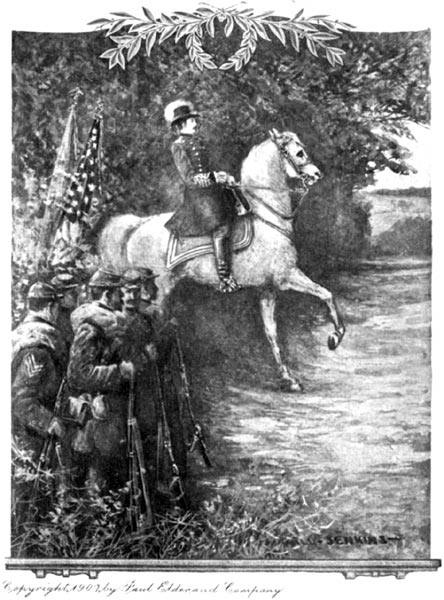| Home -> Paul Elder -> A Son of the Gods and A Horseman in the Sky - Introduction | |||
 |
|||
|
Western Classics No. Four
A Son of the Gods and A Horseman in the Sky By Ambrose Bierce Including an Introduction by W. C. Morrow The Photogravure Frontispiece After a Painting by Will Jenkins |
|||
 |
|||
|
Paul Elder and Company
San Francisco and New York Copyright, 1907 by Paul Elder and Company |
|||
 |
|||
| The Introduction Brilliant and magnetic as are these two studies by Ambrose Bierce, and especially significant as coming from one who was a boy soldier in the Civil War, they merely reflect one side of his original and many-faceted genius. Poet, critic, satirist, fun-maker, incomparable writer of fables and masterly prose sketches, a seer of startling insight, a reasoner mercilessly logical, with the delicate wit and keenness of an Irving or an Addison, the dramatic quality of a Hugo, - all of these, and still in the prime of his powers; yet so restricted has been his output and so little exploited that only the judicious few have been impressed. Although an American, he formed his bent years ago in London, where he was associated with the younger Hood on Fun. There he laid the foundation for that reputation which he today enjoys: the distinction of being the last of the scholarly satirists. With that training he came to San Francisco, where, in an environment equally as genial, his talent grew and mellowed through the years. Then he was summoned to New York to assist a newspaper fight against a great railroad, since the conclusion of which brilliant campaign eastern journalism and magazine work have claimed his attention. Two volumes, "The Fiend's Delight" and "Cobwebs from an Empty Skull" titles that would damn modern books - were collections published years ago from his work on London Fun. Their appearance made him at once the chief wit and humorist of England, and, combined with his satirical work on Fun, led to his engagement by friends of the exiled Eugénie to conduct a periodical against her enemies, who purposed to make her refuge in England untenable by means of newspaper attacks. It is easy to imagine the zest with which the chivalrous Bierce plunged into preparations for the fight. But the struggle never came; it was sufficient to learn that Bierce would be the Richmond; the attack upon the stricken ex-empress was abandoned. When he was urged in San Francisco, years afterward, to write more of the inimitable things that filled those two volumes, he said that it was only fun, a boy's work. Only fun! There has never been such delicious fun since the beginning of literature, and there is nothing better than fun. Yet it held his own peculiar quality, which is not that of American fun, - quality of a brilliant intellectuality: the keenness of a rapier, a teasing subtlety, a contempt for pharisaism and squeamishness, and above all a fine philosophy. While he has never lost his sense of the whimsical, the grotesque, the unusual, he - unfortunately, perhaps - came oftener to give it the form of pure wit rather than of cajoling humor. Few Americans know him as a humorist, because his humor is not built on the broad, rough lines that are typically American. It belongs to an older civilization, yet it is jollier than the English and bolder than the French. At all times his incomparable wit and satire has appealed rather to the cultured, and even the emotional quality of his fiction is frequently so profound and unusual as to be fully enjoyed only by the intellectually untrammelled. His writing was never for those who could only read and feel, not think. Another factor against his wider acceptance has been the infrequency and fragmentary character of his work, particularly his satire. No sustained fort in that field has come from him. His satire was born largely of a transient stimulus, and was evanescent. Even his short stories are, generally, but blinding flashes of a moment in a life. He laughingly ascribes the meagerness of his output to indolence; but there may be a deeper reason, of which he is unconscious. What is more dampening than a seeming lack of appreciation? "Tales of Soldiers and Civilians" had a disheartening search for an established publisher, and finally was brought out by an admiring merchant of San Francisco. It attracted so much critical attention that its re-publication was soon undertaken by a regular house. Had Bierce never produced anything but these prose tales, his right to a place high in American letters would nevertheless be secure, and of all his work, serious or otherwise, here is his greatest claim to popular and permanent recognition. No stories for which the Civil War has furnished such dramatic setting surpass these masterpieces of short fiction, either in power of description, subtlety of touch or literary finish. It is deeply to be regretted that he has not given us more such prose. W. C. Morrow. |
|||